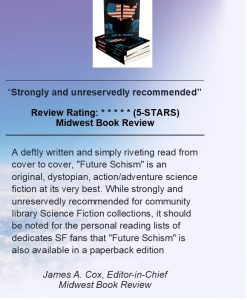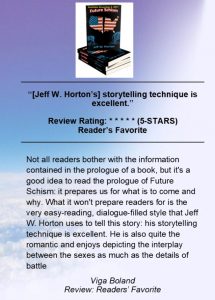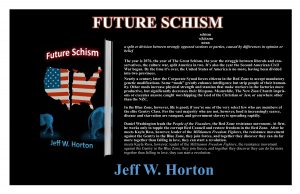Download from Amazon
Download from Barnes & Noble


SAMPLE CHAPTER
Prologue
They called it the Great Schism.
Looking back now, I suppose everyone should have seen it coming. After all, the country had gradually become increasingly polarized over the last century into two diametrically opposed groups, each on the extreme ends of the cultural spectrum.
The ideological beliefs that these two groups embraced shifted and fluctuated somewhat over time, but perhaps the underlying difference that set them apart was as old as humanity itself, and it was part of the larger battle for the hearts and minds of humanity that had waged on since the world began. Maybe the conflict between the two groups grew out of the ancient battle between the light and the darkness, between good and evil, between those who served God and those who did not.
Some believe this conflict first began in the Garden of Eden, when Eve was deceived by the serpent and sin first entered the human heart; that it took root when Cain, the first man born to Adam & Eve, murdered his brother Abel, the second man born to them. In time God established the children of Israel as His chosen people, and taught the world His laws and the difference between right and wrong, and gave humanity the opportunity to serve Him. In due time Jesus Christ, the Son of God, came into the world to ultimately save humanity from sin, to restore humanity’s relationship with God, and to reveal even greater truths. Since that time man’s rebellion against God would claim many victims, as a succession of Roman Emperors sought out and exterminated Christians throughout the empire. Some emperors, like Nero, had Christians set afire to be used as torches in his garden, while small Christian children were wrapped in sheepskins before being sent to their deaths in the arena with ravenous dogs.
Centuries later, following Constantine’s embrace of Christianity and the creation of the Holy Roman Empire, the conflict morphed into something new—science versus religion—with the scientific discoveries of men like Copernicus and Galileo that went against Church teachings, leading many to begin questioning their faith in God and His Church.
The battle intensified in the 19th century with the publication of Origin of the Species by Charles Darwin, and the now infamous Scopes trial of 1925, and expanded significantly during and following the cultural revolution of the 1960s. Nowhere, however, was the conflict more evident than the battle to legalize abortion, with science on one side of the issue and religion on the other. The issue was resolved legally with the landmark decision by the U.S. Supreme Court known as Roe vs. Wade, which made abortions legal across the United States.
Thus, the age old conflict soon came to be known as The Culture War, a term which basically gave a label to an ancient dilemma. Inside the United States, it
was considered by many to be an ideological war between the progressive movement and those who held to more traditional, or conservative ideals.
By the early 1960s the progressive movement, or “liberals,” especially the media, had begun infiltrating all areas of government, especially schools, universities, and the judicial branch, affording them the opportunity to have the greatest impact in the shortest timeframe possible. These inroads enabled them to make tremendous progress in their efforts to spread their influence worldwide. The liberal ideology quickly spread like wildfire on college campuses across America, spurred on by like-minded professors who shared the liberal vision of a society free of God and everything that went along with Him.
The traditional, or “conservative,” movement was caught off-guard, and was somewhat ill-prepared to deal with the onslaught, though by the 1990s they had started “digging-in” and began mounting a series of short-lived counter attacks, including The Christian Coalition, Speaker of the House Newt Gingrich’s Contract with America, and later the Tea Party.
By the close of the first decade of the new millennium, a new president, elected with the hope of bringing the nation together, had proven to be one of the most divisive presidents in American history, deepening the divisiveness and distrust already in progress by forcing both sides to harden their positions on issues such as legal immigration versus illegal immigration, free trade versus America first, homosexual rights versus traditional marriage, and unlimited tax and spend versus fiscal responsibility.
Throughout most of the 21st century the divide grew deeper and deeper, until eventually someone decided that, in America at least, it might be best if the two competing ideological groups segregated, essentially splitting the country into two equal parts, with the more liberal citizens migrating toward the west coast and the more conservative citizens migrating toward the east coast. Many reasoned that the United States had, after all, been divided nearly 50/50 for over a century anyway; this step only made it official.
On January 21, 2076, a large gathering of activists in San Francisco, California, led by Governor Jose Leto, suddenly declared that the entire liberal movement, now calling itself the People’s Liberal Socialist Democratic State, was seceding from the United States and forming its own government. The secession was, of course, considered an act of rebellion, leaving the rest of the country no choice but to respond, leading to the start of the Second Civil War of the United States.
Soon after it began, however, it soon became clear that the outcome of the second war would be considerably different than the first. The PLSDS was losing terribly and was on the verge of annihilation; with the PLSDS too stubborn or too foolhardy to surrender despite abundant devastation and massive casualties, the leadership in Washington, DC eventually decided to end the war in hopes that one day, the two halves would eventually become whole again. The move was widely celebrated, since most people understood that had the war continued
much longer, the devastation and death resulting from even a nuke-free war would not have left enough of the PLSDS to rejoin the rest of the country. So, the war ended in a cease fire, and concluded with an eventual peace treaty, which was signed on a Christmas Eve nearly three years after the war began, on December 24, 2079.
The war had taken a very heavy toll, however, and not just on the United States. By the year 2079 global economies had become intricately intertwined and linked, so much so that even countries who had the foresight to see what was coming before the secession of the PLSDS had been unable to untangle themselves in time to avert disaster. With the economic and financial infrastructure of the world’s largest economy, the United States, in complete collapse and disarray following the Great Schism, country after country soon found themselves following suit. Economy after economy crashed, until the entire global market had collapsed to the point that it would be several decades before it was ever to recover to the point that any meaningful trading could take place again. It was a global disaster of biblical proportions, which left governments, who might otherwise have sought to capitalize on the misfortunes of the United States, so busy trying to hold their own countries together that it offered them little time to cause trouble.
With the PLSDS having left and taken half the country with it, the more conservative citizens of what remained of the United States, coming to grips with the new state of affairs, decided to make a fresh start of it as well, changing the name of what remained of their country to the Free Market Republic of Conservatism.
On that dark day for the world, and what was to become a very sad day for America, after nearly three-hundred years as a nation, the country that rose to become the most powerful nation the world has ever known, the United States of America, was suddenly no more. From then on there would be not one civilization between Canada and Mexico, but two, the People’s Liberal Socialist Democratic State, commonly referred to as The Blue Zone, and the Free Market Republic of Conservatism, commonly referred to as The Red Zone.
A single nation, once divided by ideology, had split into two distinct provinces now ruled by the respective ideology of each. It was a social experiment that would have ramifications for billions of people the world over for generations to come.
Chapter 1
July 1, 2126
The butt of the weapon struck my friend on the side of his head, producing a cracking sound that I could easily hear over the crowd. The blow barely missed his temple, a blow that would likely have killed him. I would have considered it a mercy, given what he’d already been through and what lay ahead of him. Undoubtedly the soldier who’d struck him would have been executed on the spot had the reckless blow prematurely killed the man who had been like a brother to me, the leader of the revolution, and my best friend’s husband.
From where I stood watching from across the crowded stadium, I could catch glimpses of his face as he made his way toward the platform, surrounded by soldiers from both camps. The pronounced limp and the repeated tumbles to the pavement, along with the swollen eyes and blood flowing from his nose and mouth, made it evident that he’d been severely beaten and tortured, his captors determined to glean all the information they could about the number of remaining resistance fighters, troop movements, and planned attacks prior to his very public execution.
Eventually my friend cleared the crowd and entered the area surrounding the platform where the security and police forces were, and I was offered a much better view of his face. I sighed heavily, relaxed, and took in a deep breath upon catching a glimpse of the now all-too-familiar look of pure determination, and even a slight grin, on his bloodied, tortured face. I shook my head in amazement, wondering how he was able to keep his composure after the way he’d been treated. I supposed he knew they would have eventually extracted everything they wanted to know, given enough time and torture, but there was a sense of urgency for the Red Council to bring an abrupt end to the revolution, and their inability to break him gave him some measure of victory over his enemies, however slight the victory may have been. At last I had come to understand something that had puzzled me since he’d been chosen to lead the resistance; why Daniel? Watching my friend sneer at his enemies to his left as he approached the steps to the platform, it was clear that it was his strength, his raw courage, and faith that had brought them so far, nearly to the point of toppling not just one government, but two. Daniel truly was a man of great strength and courage.
Chapter 2
Twenty-Four Years Earlier
October 21, 2102
The two women sat without speaking in the back of the spacious limousine, with the younger of the two women wearing a lavender dress and a gold necklace that would easily have cost the other more than a year’s salary. It would not take a discerning eye to conclude the older woman was likely employed by the younger, and in truth, this was the case, for Helen Jacobski was indeed the housekeeper for Amanda Williamson.
It was dark outside, yet a reading light inside the limousine enabled Helen to read from a small paperback while the limousine made its way through the endless stoplights, turns, and stretches of road.
If time passed quickly and easily for Helen, the same could hardly be said for Amanda. Her brow often furrowed as she stared aimlessly out the window, her mind fully engaged with whatever thoughts occupied her mind. The occasional biting of the lip only served to accentuate the anxiety she felt over whatever was about to happen.
“Are you okay, Mrs. Williamson?”
The housekeeper’s question broke the silence, and for a moment, distracted Amanda from her concerns.
“Quite, thank you, Helen,” she replied, aware her answer was only half true. “At least, I think so.”
“If you’re having second thoughts, ma’am, I’m certain it won’t be any problem at all; I can just tell—”
“No…no, Helen, it’s not that. You know how long Paul and I’ve waited for something like this.”
“Yes, ma’am, I do.”
“It’s just…well, are we doing the right thing?”
“I suppose only you can answer that, Mrs. Williamson.”
Amanda smiled back at the older woman, and nodded. She knew Helen was right.
***
Amanda and Helen were sitting across the table from one another, engaged in some idle conversation, when a much younger woman in a black leather jacket, most likely in her late teens, entered the restaurant. She was beautiful, despite having something of an unhealthy demeanor, something Amanda felt certain couldn’t have been helped any by the sort of lifestyle she was certain the young woman lived.
The visitor looked around in all directions for several seconds until her eyes finally landed on Helen. Her eyes immediately widened, and an expression of
joy mixed with sadness and fear covered her face as she approached the table. The two women stood up to greet her.
“Helen!”
“Jasmine, dear! How are you holding up?”
“About as well as can be expected, I suppose, Helen. The doctors…well, they say I won’t have to wait much longer.”
“Oh…I’m so sorry, sweetheart, truly I am!”
Jasmine smiled appreciatively before turning to Amanda. “You must be Amanda Williamson.”
“I am; it’s such a pleasure to meet you, my dear. You must be Jasmine.”
“Yeah, that’s right.” The younger woman studied Amanda for several moments, as if assessing her trustworthiness. After a while, she nodded to herself, as if concluding she liked her. Jasmine then reached up and unzipped her jacket. Nestled inside her jacket was a beautiful baby dressed in a pink outfit. “And this is Kayla.”
Jasmine carefully took Kayla and held her for several moments, looking into her daughter’s emerald-green eyes for some time, before finally looking up at Amanda. Perhaps it was the look of warmth she saw in the woman’s face, or maybe it was the tears Jasmine saw forming in the corners of Amanda’s eyes. For whatever reason, without saying another word Jasmine smiled and handed Kayla to Amanda, whose stunned expression amused Jasmine.
“What; you wanted to adopt a baby, didn’t you?”
Amanda stood there for a while, speechless. “Oh yes, of course. She’s just so…beautiful!”
“Yeah, she is, isn’t she?”
Amanda stood staring at Jasmine for several seconds, until the girl grew increasingly uncomfortable.
“What?”
“Oh, nothing.
“What?”
“Well…I was just wondering—”
“Why I’m giving her up?”
Amanda furrowed her brow before eventually nodding.
Because I’m dying. I can’t trust myself to take care of her anymore.”
“I’m…very, very sorry, my dear.”
“Don’t be; we all die eventually, it’s just a matter of time. I didn’t know about the cancer until after she was born. When I found out I started looking around to see who might take care of her when I’m gone; her dirt-bag father was nowhere to be found, both of my parents are dead, and I don’t have any other relatives around that I can depend on. To be honest, I was scared to death about what was going to happen to my little Kayla….” Tears burst forth on their own accord, no longer willing to be constrained. Amanda rushed over and wrapped her free arm around Jasmine, who continued. “So, when I was telling Helen
about my situation, and she told me about you and your husband, that you’d been unable to adopt because you’re such a traditional couple, we thought you’d be the perfect couple to adopt Kayla.”
“Listen, Jasmine, I think you’re a very brave, young woman. If you’re willing, I’d very much like for you to come live with us, and with Kayla.”
Jasmine gently pulled away from Amanda so she could look her in the eyes. “Are you saying you’d like to adopt me too?”
Amanda smiled warmly at Jasmine. She also turned for a moment and looked at Helen, who to her surprise had tears streaming down her face.
“Yes, Jasmine, I suppose I am. What do you say…will you come live with us?”
Jasmine looked at Amanda, at Kayla, then at Helen, who nodded at her with great encouragement. Jasmine turned and looked back at Kayla, and after gently rubbing her head, looked back at Amanda. “Yeah, thanks; I think I’d like that very much.”
Download from Amazon
Download from Barnes & Noble
